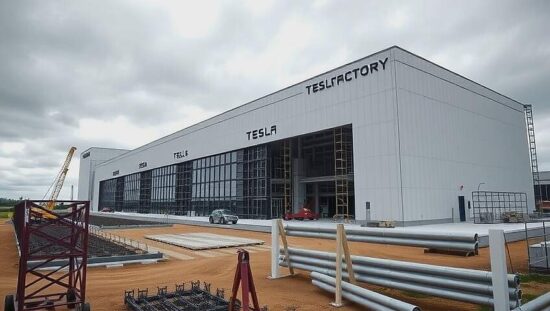Expansion plans for Tesla’s Gigafactory in Grünheide, Brandenburg, are facing increasing uncertainty, according to a recent report. While initial projections envisioned an annual production capacity of one million vehicles, Tesla has yet to submit further permit applications to facilitate this expansion, including those related to the promised on-site battery cell production. The first of three partial approvals was granted by the State Office for the Environment last October.
Public sector investment already totals several hundred million euros, earmarked for infrastructure improvements – including roads and a new rail connection slated for completion in 2026 – with Deutsche Bahn estimating costs of 244 million euros for the rail link alone.
These investments were predicated on Tesla’s plans, which anticipated the creation of up to 40,000 jobs. However, the company apparently no longer expects to fulfill the ambitious promises made by CEO Elon Musk. Current permit applications outline a workforce of 22,500 employees at full capacity, significantly lower than the initial forecast. Approximately 11,000 people are currently employed at the Grünheide facility.
Production at the site is presently operating below its potential capacity of 500,000 vehicles annually. Factory Manager André Thierig indicated the facility is ramping up production to exceed 5,000 vehicles per week, though it is approved for double that output. He attributed this to aligning production with current demand.
Thierig expressed confidence in the factory’s performance, describing it as “very good and stable” and maintaining that Germany remains an attractive location for Tesla. He stated that the expansion is proceeding according to plan, with no delays, but acknowledged that it is contingent upon a significant increase in demand for electric vehicles. He also clarified that the permits currently in place represent an option, not a guarantee.
Should the expansion fail to materialize, it would represent a setback for the Brandenburg state government, which has consistently advocated for Tesla’s interests.
Former State Environment Minister Axel Vogel highlighted that his ministry had specifically created new positions to manage the large-scale project during its initial establishment, resulting in other applications remaining unprocessed. Expansion plans rapidly became the dominant focus within the state government, with Tesla initially applying considerable pressure to expedite permit approvals. This pressure has noticeably diminished with the anticipated downturn in sales.





